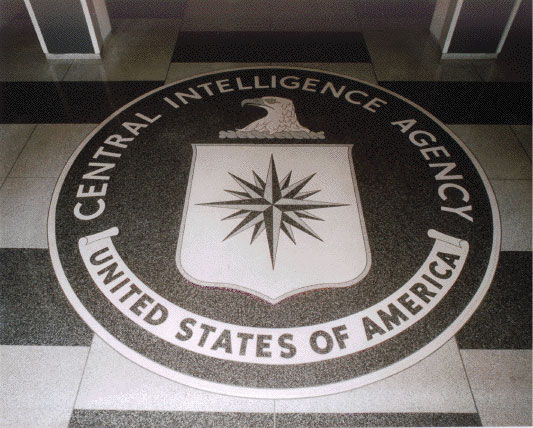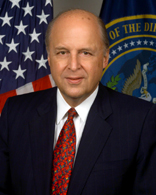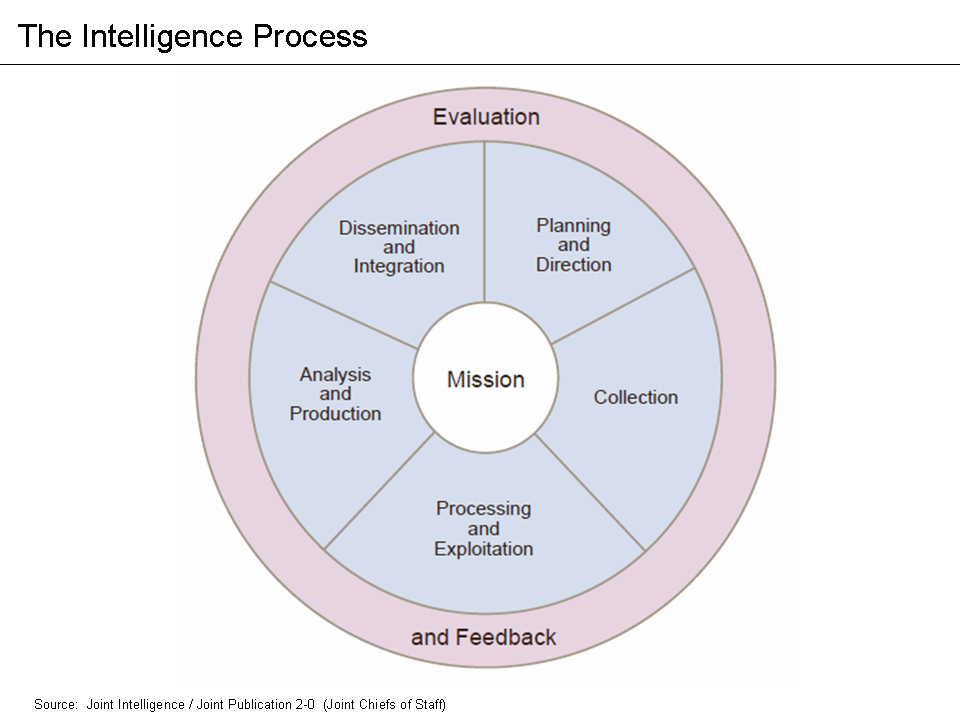|
Special National Intelligence Estimate
National Intelligence Estimates (NIEs) are United States federal government documents that are the authoritative assessment of the Director of National Intelligence (DNI) on intelligence related to a particular national security issue. NIEs are produced by the National Intelligence Council and express the coordinated judgments of the United States Intelligence Community, the group of 18 U.S. intelligence agencies. NIEs are classified documents prepared for policymakers. General overview NIEs are considered to be "estimative" products, in that they present what intelligence analysts estimate may be the course of future events. Coordination of NIEs involves not only trying to resolve any inter-agency differences, but also assigning confidence levels to the key judgments and rigorously evaluating the sourcing for them. Each NIE is reviewed and approved for dissemination by the National Intelligence Board (NIB), which comprises the DNI and other senior leaders within the Intelligence ... [...More Info...] [...Related Items...] OR: [Wikipedia] [Google] [Baidu] |
Federal Government Of The United States
The federal government of the United States (U.S. federal government or U.S. government) is the national government of the United States, a federal republic located primarily in North America, composed of 50 states, a city within a federal district (the city of Washington in the District of Columbia, where most of the federal government is based), five major self-governing territories and several island possessions. The federal government, sometimes simply referred to as Washington, is composed of three distinct branches: legislative, executive, and judicial, whose powers are vested by the U.S. Constitution in the Congress, the president and the federal courts, respectively. The powers and duties of these branches are further defined by acts of Congress, including the creation of executive departments and courts inferior to the Supreme Court. Naming The full name of the republic is "United States of America". No other name appears in the Constitution, and this i ... [...More Info...] [...Related Items...] OR: [Wikipedia] [Google] [Baidu] |
National Intelligence Board
The National Intelligence Board (NIB), formerly the National Foreign Intelligence Board and before that the United States Intelligence Board is a body of senior U.S. Intelligence Community leaders currently led by the Director of National Intelligence (DNI). The Board is tasked with reviewing and approving National Intelligence Estimates (NIEs). United States Intelligence Board The first incarnation of the Board was the United States Intelligence Board, a forum of intelligence agency leaders convened to advise the Director of Central Intelligence on intelligence matters established by President Eisenhower in 1957 upon the recommendation of the Presidential Board of Consultants on Foreign Intelligence Activities (now the President's Intelligence Advisory Board). National Foreign Intelligence Board A quotation from a 1999 report entitled ''A Consumer's Guide to Intelligence'', published by the Office of Public Affairs in the CIA describes the NFIB as: "the senior Intelligence ... [...More Info...] [...Related Items...] OR: [Wikipedia] [Google] [Baidu] |
United States Intelligence Agencies
United may refer to: Places * United, Pennsylvania, an unincorporated community * United, West Virginia, an unincorporated community Arts and entertainment Films * ''United'' (2003 film), a Norwegian film * ''United'' (2011 film), a BBC Two film Literature * ''United!'' (novel), a 1973 children's novel by Michael Hardcastle Music * United (band), Japanese thrash metal band formed in 1981 Albums * ''United'' (Commodores album), 1986 * ''United'' (Dream Evil album), 2006 * ''United'' (Marvin Gaye and Tammi Terrell album), 1967 * ''United'' (Marian Gold album), 1996 * ''United'' (Phoenix album), 2000 * ''United'' (Woody Shaw album), 1981 Songs * "United" (Judas Priest song), 1980 * "United" (Prince Ital Joe and Marky Mark song), 1994 * "United" (Robbie Williams song), 2000 * "United", a song by Danish duo Nik & Jay featuring Lisa Rowe Television * ''United'' (TV series), a 1990 BBC Two documentary series * ''United!'', a soap opera that aired on BBC One from 1965-19 ... [...More Info...] [...Related Items...] OR: [Wikipedia] [Google] [Baidu] |
National Security Archive
The National Security Archive is a 501(c)(3) non-governmental, non-profit research and archival institution located on the campus of the George Washington University in Washington, D.C. Founded in 1985 to check rising government secrecy. The National Security Archive is an investigative journalism center, open government advocate, international affairs research institute, and the largest repository of declassified U.S. documents outside the federal government. The National Security Archive has spurred the declassification of more than 10 million pages of government documents by being the leading non-profit user of the U.S. Freedom of Information Act (FOIA), filing a total of more than 50,000 FOIA and declassification requests in its over 30 years of history. Organization history and accolades Led by founder Scott Armstrong, former Washington Post Reporter and staff on the Senate Watergate Committee, journalists and historians came together to create the National Security Arc ... [...More Info...] [...Related Items...] OR: [Wikipedia] [Google] [Baidu] |
Intellipedia
Intellipedia is an online system for collaborative data sharing used by the United States Intelligence Community (IC). It was established as a pilot project in late 2005 and formally announced in April 2006. Intellipedia consists of three wikis running on the separate JWICS (Intellipedia-TS), SIPRNet (Intellipedia-S), and DNI-U (Intellipedia-U) networks. The levels of classification allowed for information on the three wikis are Top Secret Sensitive Compartmented Information (TS SCI), Secret (S), and Sensitive But Unclassified (SBU or FOUO) information, respectively. Each of the wikis is used by individuals with appropriate clearances from the 18 agencies of the US intelligence community and other national-security related organizations, including Combatant Commands and other federal departments. The wikis are not open to the public. Intellipedia is a project of the Office of the Director of National Intelligence (ODNI) Intelligence Community Enterprise Services (ICES ... [...More Info...] [...Related Items...] OR: [Wikipedia] [Google] [Baidu] |
Iraq And Weapons Of Mass Destruction
Iraq actively researched and later employed weapons of mass destruction (WMD) from 1962 to 1991, when it destroyed its chemical weapons stockpile and halted its biological and nuclear weapon programs as required by the United Nations Security Council. The fifth president of Iraq, Saddam Hussein, was internationally condemned for his use of chemical weapons during the 1980s campaign against Iranian and Kurdish civilians during and after the Iran–Iraq War. In the 1980s, Saddam pursued an extensive biological weapons program and a nuclear weapons program, though no nuclear bomb was built. After the Gulf War (1990–1991), the United Nations (with the Government of Iraq) located and destroyed large quantities of Iraqi chemical weapons and related equipment and materials; Iraq ceased its chemical, biological and nuclear programs. In the early 2000s, U.S. President George W. Bush and U.K. Prime Minister Tony Blair both asserted that Saddam Hussein's weapons programs were still active ... [...More Info...] [...Related Items...] OR: [Wikipedia] [Google] [Baidu] |
Director Of Central Intelligence
The director of central intelligence (DCI) was the head of the American Central Intelligence Agency from 1946 to 2005, acting as the principal intelligence advisor to the president of the United States and the United States National Security Council, as well as the coordinator of intelligence activities among and between the various US intelligence agencies (collectively known as the United States Intelligence Community, Intelligence Community from 1981 onwards). The office existed from January 1946 to April 21, 2005. After the Intelligence Reform and Terrorism Prevention Act it was replaced by the Director of National Intelligence, director of national intelligence (DNI) as head of the Intelligence Community and the director of the Central Intelligence Agency (D/CIA) as head of the CIA. History The post of DCI was established by President of the United States, President Harry Truman on January 23, 1946, with Admiral Sidney Souers being the first DCI, followed by General Hoy ... [...More Info...] [...Related Items...] OR: [Wikipedia] [Google] [Baidu] |
Office Of National Estimates
The National Intelligence Council (NIC), established in 1979 and reporting to the Director of National Intelligence, bridges the United States Intelligence Community (IC) with policy makers in the United States. The NIC produces the "Global Trends" report every four years beginning in 1997, for the incoming President of the United States. Their work is based on intelligence from a wide variety of sources that includes experts in academia and the private sector. NIC documents and reports which are used by policymakers, include the National Intelligence Estimate and the Global Trends reports delivered every four years. The NIC's goal is to provide policymakers with the best available information, that is unvarnished, unbiased and without regard to whether the analytic judgments conform to current U.S. policy. One of the NIC's most important analytical projects is a Global Trends report produced for the incoming US president, which is usually delivered to the incoming president ... [...More Info...] [...Related Items...] OR: [Wikipedia] [Google] [Baidu] |
Confidence Interval
In frequentist statistics, a confidence interval (CI) is a range of estimates for an unknown parameter. A confidence interval is computed at a designated ''confidence level''; the 95% confidence level is most common, but other levels, such as 90% or 99%, are sometimes used. The confidence level represents the long-run proportion of corresponding CIs that contain the true value of the parameter. For example, out of all intervals computed at the 95% level, 95% of them should contain the parameter's true value. Factors affecting the width of the CI include the sample size, the variability in the sample, and the confidence level. All else being the same, a larger sample produces a narrower confidence interval, greater variability in the sample produces a wider confidence interval, and a higher confidence level produces a wider confidence interval. Definition Let be a random sample from a probability distribution with statistical parameter , which is a quantity to be estimate ... [...More Info...] [...Related Items...] OR: [Wikipedia] [Google] [Baidu] |
Director Of National Intelligence
The director of national intelligence (DNI) is a senior, cabinet-level United States government official, required by the Intelligence Reform and Terrorism Prevention Act of 2004 to serve as executive head of the United States Intelligence Community (IC) and to direct and oversee the National Intelligence Program (NIP). All IC agencies report directly to the DNI. The DNI also serves, upon invitation, as an advisor to the president of the United States, the National Security Council and the Homeland Security Council on all intelligence matters. The DNI, supported by the Office of the Director of National Intelligence (ODNI), produces the President's Daily Brief (PDB), a top-secret document including intelligence from all IC agencies, handed each morning to the president of the United States. President George W. Bush strengthened the role of the DNI on July 30, 2008, with Executive Order 13470, which, among other things, solidified the DNI's authority to set goals for intelligenc ... [...More Info...] [...Related Items...] OR: [Wikipedia] [Google] [Baidu] |
Intelligence Analysis
Intelligence analysis is the application of individual and collective cognitive methods to weigh data and test hypotheses within a secret socio-cultural context. The descriptions are drawn from what may only be available in the form of deliberately deceptive information; the analyst must correlate the similarities among deceptions and extract a common truth. Although its practice is found in its purest form inside national intelligence agencies, its methods are also applicable in fields such as business intelligence or competitive intelligence. Overview Intelligence analysis is a way of reducing the ambiguity of highly ambiguous situations. Many analysts prefer the middle-of-the-road explanation, rejecting high or low probability explanations. Analysts may use their own standard of proportionality as to the risk acceptance of the opponent, rejecting that the opponent may take an extreme risk to achieve what the analyst regards as a minor gain. The analyst must avoid the special ... [...More Info...] [...Related Items...] OR: [Wikipedia] [Google] [Baidu] |
Policymaker
Policy is a deliberate system of guidelines to guide decisions and achieve rational outcomes. A policy is a statement of intent and is implemented as a procedure or protocol. Policies are generally adopted by a governance body within an organization. Policies can assist in both ''subjective'' and ''objective'' decision making. Policies used in subjective decision-making usually assist senior management with decisions that must be based on the relative merits of a number of factors, and as a result, are often hard to test objectively, e.g. work–life balance policy... Moreover, Governments and other institutions have policies in the form of laws, regulations, procedures, administrative actions, incentives and voluntary practices. Frequently, resource allocations mirror policy decisions. Policy is a blueprint of the organizational activities which are repetitive/routine in nature. In contrast, policies to assist in objective decision-making are usually operational in nature an ... [...More Info...] [...Related Items...] OR: [Wikipedia] [Google] [Baidu] |





